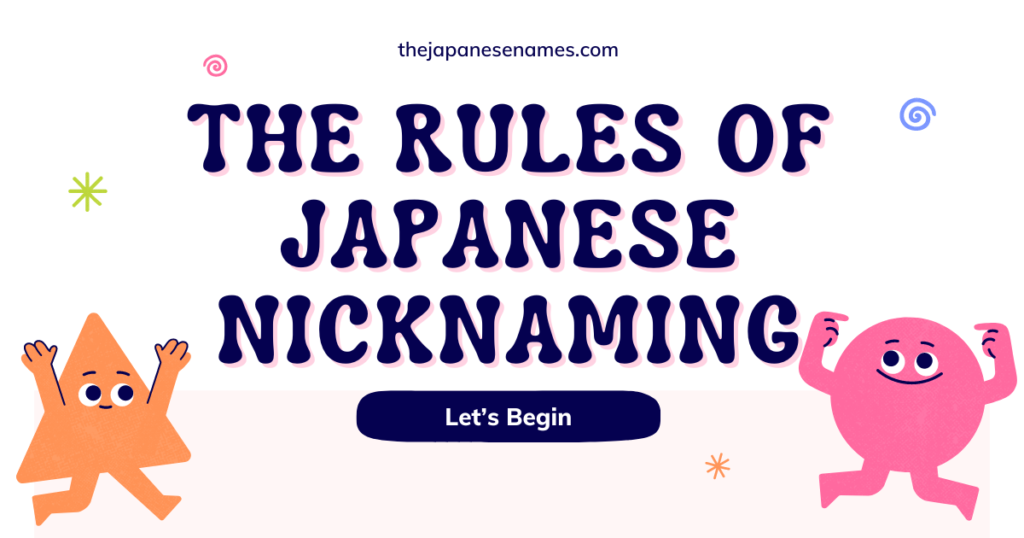There are many different and cool ways to come up with ideas for a nicknames in languages worldwide, but the rules of Japanese nicknaming are cool and creative, making it fun!
Today we will not only be looking at the rules of Japanese nicknaming but also be decoding them. Please note that this is my method of decoding Japanese nicknames and I am not breaking any Japanese rules.
The Rules Of Japanese Nicknaming

So according to my detailed study on this topic, the Japanese nicknaming rules are 5 in number and we will be going through all of them today. Starting From Now:
Rule No. 1: Shortening Your Full Name
This rule is simple and is also being used in Western areas.
Take it like this “In western areas” we use “Jord” as a nickname for “Jordan” and use “Zen” as a nickname for “Zendaya”.
Similarly, for Japanese nicknaming, we use the same principle of nicknaming as in Western areas. The Japanese use “Hina” as a nickname for “Hinata” and use Nobi as a nickname for “Nobita”.
Even though they are becoming less and less common, there are a lot of female names that end in “-ko,” and the “-ko” is frequently omitted. For instance, Kumiko is frequently jokingly abbreviated as “Kumi.”
Rule No. 2: Using The Surname
In the Japanese culture, the Japanese people (Men and Women) use surnames much more often then the people all around the world.
Because the people of Japan respect and honor the surnames more than foreign people. In Japan the surname is shortened often and some famous suffix that you might heard in Japanese culture is attached to it.
Like “Hina-chan” as a nickname for Hinata (Female) and “Nobi-kun” as a nickname for “Nobita” (Male).
Most of the females if they love a person (male) they mostly use “chan” with the person’s name to express love. And most of the males use “Kun” with a girl’s name to express their love for her.
This can also be used to express your love to your relatives like “Brother and Sister” and “Mother and Father”.
The next rule will be describing this (chan and kun) rule in detail.
Rule No. 3: Adding a Suffix To The Given Name
In Japanese culture there is a lot of use of suffixes, there are different kinds of suffixes in Japanese nicknames from funny to strange and cool ones.
Or you can create your one!
Kun
It is used for giving honor or expressing your respect for your specifically male friends or male relatives who are younger or are the same age as you are.
So basically Japanese culture often attaches suffixes to the given name like “Shikamaru” becomes “Shika-Kun”.
Chan
“Chan” is used as an inspiring honorific in Japanese culture. It is used for females or ladies that are younger or as same age as you like “Sakura” becomes “Sakura-chan”
But “Chan” can also be used for males or adults to express your love or respect for them.
Tan
This is a very affectionate way to name cute babies or children to express their cuteness. But it also can be used for Adults to call them cute in Japanese style.
So basically “Gamini” (Female) becomes ” Gami-chan” and “Mandid” (Male) becomes “Mandi-tan”. So Cute!
Rin
This is a more cuter and funny form of “chan” and “tan” which you can use for close and cute friends as to express their friendship or love.
So “Moari” (Female) becomes “Mao-rin” and “Mako” (Male) becomes “Mako-rin”
Rule No. 3: Combining and Mixing Surname with the Given Name
Did you know that combining elements of one’s given name and surname to create a nickname is a prevalent practice in Japan? This is a very different practice from naming practices in the West.
One of the most fascinating things about Japanese culture is perhaps the way that nicknames are created by combining names.
Japanese people take great satisfaction in creating unique nicknames that accurately represent who they are, in contrast to people in the West where nicknames are frequently unrelated to one’s given or family name.
Take Kimura Takuya, for example. Fans all around Japan refer to the well-known actor as “Kimu-Taku” with affection.
Similar to this, people with names like Kato Kenji or Kato Kenichi sometimes take on the nickname “Kato-Ken,” as it has a pleasing resonance in Japanese.
This process of merging name components to create nicknames emphasizes how important phonetics and aesthetics are in Japanese society.
A meaningful nickname that sounds good when spoken aloud is essential, highlighting the value of linguistic harmony in Japanese culture.
Essentially, the act of combining aspects of the given and surname to form nicknames highlights the ingenuity and linguistic nuances inherent in Japanese naming conventions, contributing to the nation’s cultural diversity.
Rule No. 5: Phonetic Resonance
The idea of phonetic resonance plays an interesting role in Japanese nicknaming culture.
Japanese nicknaming frequently adheres to the idea of phonetic harmony, in contrast to Western naming customs where nicknames may be selected randomly or based on personal taste.
This rule states that a nickname ought to have a pleasant sound that complements the person’s given name.
This means taking into account elements like phonetic flow overall, consonant-vowel balance, and syllable count.
A fitting nickname, for someone whose given name is “Haruki,” may be “Haru,” keeping the original name’s melodic cadence and rhythmic harmony.
The Japanese value harmony and balance in language is reflected in the law of phonetic resonance, which goes beyond aesthetics.
Following this rule makes nicknames more aesthetically pleasing and symmetrical, in addition to being simpler to say and recall.
Furthermore, the phonetic resonance rule emphasizes how crucial linguistic dexterity and cultural awareness are to Japanese communication.
It illustrates how language can be used as a tool to create intimacy and convey love in nuanced yet meaningful ways.
Therefore, understanding this guideline can improve one’s capacity to negotiate social situations in Japan and create lasting bonds through the practice of nicknaming.
Frequently Asked Questions (FAQs)
What cultural influences shape Japanese nicknaming traditions?
Japanese customs around nicknames have their roots in cultural ideals like harmony, respect, and symbolism.
Creating meaningful nicknames is mostly dependent on the phonetic structure of the language and the meanings of the characters.
Furthermore, the intricate web of Japanese nicknaming conventions is woven together by social dynamics, familial relationships, and historical influences, rendering them a crucial aspect of Japanese interpersonal communication.
How do Japanese nicknames reflect cultural values?
Japanese nicknames frequently allude to cultural ideals such as harmony, deference, and appreciation of the arts. Incorporating aspects of nature, emotions, virtues, or historical allusions can help to strengthen ties within Japanese culture.
Can Japanese nicknames convey deeper cultural meanings beyond their phonetic composition?
Indeed. Japanese nicknames frequently capture the cultural quirks, character features, or aspirational qualities of the bearer.
Japanese nicknames have deeper meanings and represent a person's character or goals by combining nature, emotions, virtues, or historical allusions.
Because of this cultural diversity, nicknames have more meaning in Japanese society, strengthening bonds and preserving cultural identity.
How do Japanese nicknaming traditions differ from the West?
Unlike Western nicknaming customs, Japanese nicknaming emphasizes phonetic harmony and cultural connotation.
Japanese nicknames, in contrast to Western customs, frequently mix aspects of the given name and surname to produce a melodic and culturally meaningful outcome.
Social aspects can come into play, such as nicknames given by friends or relatives. Gaining an understanding of these differences might help one better understand the cultural subtleties of identity expression and human connection.
The Bottom Line
In conclusion, learning the rules of Japanese nicknaming reveals an intriguing facet of Japanese social dynamics and culture.
Understanding the subtleties of connections, communication, and identity in Japanese society is possible by exploring the complexities of how names are produced and deciphered.
Adhering to these guidelines not only improves our understanding of Japanese culture but also helps us build stronger relationships and understanding with Japanese people.
Navigating the world of Japanese nicknaming, whether as participants or viewers, enhances our interpersonal interactions and cultural knowledge, overcoming cultural gaps and creating meaningful connections across boundaries.
